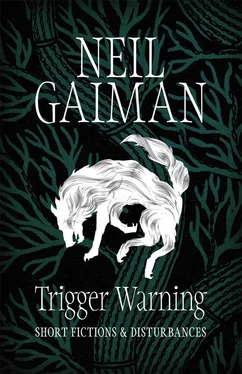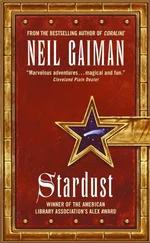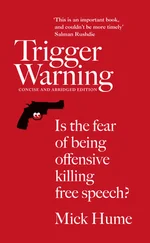Neil Gaiman - Trigger Warning - Short Fictions and Disturbances
Здесь есть возможность читать онлайн «Neil Gaiman - Trigger Warning - Short Fictions and Disturbances» весь текст электронной книги совершенно бесплатно (целиком полную версию без сокращений). В некоторых случаях можно слушать аудио, скачать через торрент в формате fb2 и присутствует краткое содержание. Год выпуска: 2015, Издательство: Headline, Жанр: Старинная литература, на английском языке. Описание произведения, (предисловие) а так же отзывы посетителей доступны на портале библиотеки ЛибКат.
- Название:Trigger Warning: Short Fictions and Disturbances
- Автор:
- Издательство:Headline
- Жанр:
- Год:2015
- ISBN:нет данных
- Рейтинг книги:4 / 5. Голосов: 1
-
Избранное:Добавить в избранное
- Отзывы:
-
Ваша оценка:
- 80
- 1
- 2
- 3
- 4
- 5
Trigger Warning: Short Fictions and Disturbances: краткое содержание, описание и аннотация
Предлагаем к чтению аннотацию, описание, краткое содержание или предисловие (зависит от того, что написал сам автор книги «Trigger Warning: Short Fictions and Disturbances»). Если вы не нашли необходимую информацию о книге — напишите в комментариях, мы постараемся отыскать её.
Trigger Warning: Short Fictions and Disturbances — читать онлайн бесплатно полную книгу (весь текст) целиком
Ниже представлен текст книги, разбитый по страницам. Система сохранения места последней прочитанной страницы, позволяет с удобством читать онлайн бесплатно книгу «Trigger Warning: Short Fictions and Disturbances», без необходимости каждый раз заново искать на чём Вы остановились. Поставьте закладку, и сможете в любой момент перейти на страницу, на которой закончили чтение.
Интервал:
Закладка:
and did not care if this was Hove or Hell. We’d eat
our slippery eggs together. I’d watch them promenade
if the day was fine, or huddle under awnings if it rained. My landlady
cared only that they were out of the house until teatime.
A retired dentist from Edgbaston, down for a week
of loneliness and drizzle by the sea, would nod at me over breakfast,
or if we passed on the seafront. The bathroom was down the hall. I was up
in the night. I saw him in his dressing gown. I saw him knock upon
her door. I saw it open. He went in. There’s nothing more to tell.
My landlady was there at breakfast, bright and cheery. She said
the dentist had left early, owing to a death in the family. She told the truth.
That night the rain rattled the windows. A week passed,
and it was time: I told my landlady I’d found a place
and would be moving on, and paid the rent.
That night she gave me a glass of whisky, and then another, and said
I had always been her favourite, and that she was a woman of needs,
a flower ripe for plucking, and she smiled, and it was the whisky made me nod,
and think she was perhaps a whit less sour of face and form. And so
I knocked upon her door that night. She opened it: I remember
the whiteness of her skin. The whiteness of her gown. I can’t forget.
‘Mister Maroney,’ she whispered. I reached for her, and that was forever
that. The Channel was cold and salt-wet, and she filled my pockets with rocks
to keep me under. So when they find me, if they find me,
I could be anyone, crab-eaten flesh and sea-washed bones and all.
I think I shall like it here in my new digs, here on the seashore. And you
have made me welcome. You have all made me feel so welcome.
How many of us are here? I see us, but I cannot count.
We cluster on the beach and stare at the light in the uppermost room
of her house. We see the curtains twitch, we see a white face
glaring through the grime. She looks afraid, as if one loveless day we might
start up the pebbles towards her, to rebuke her for her lack of hospitality,
to tear her for her bad breakfasts and her sour holidays and our fates.
We stand so still.
Why must we stand so still?
Adventure Story
In my family ‘adventure’ tends to be used to mean ‘any minor disaster we survived’ or even ‘any break from routine’. Except by my mother, who still uses it to mean ‘ what she did that morning ’. Going to the wrong part of a supermarket car park and, while looking for her car, getting into a conversation with someone whose sister, it turns out, she knew in the 1970s would qualify, for my mother, as a full-blown adventure.
She is getting older, now. She no longer gets out of the house as she used to. Not since my father died.
My last visit to her, we were clearing out some of his possessions. She gave me a black leather lens-case filled with tarnished cuff links, and invited me to take any of my father’s old sweaters and cardigans I wanted, to remember him by. I loved my father, but couldn’t imagine wearing one of his sweaters. He was much bigger than me, all my life. Nothing of his would fit me.
And then I said, ‘What’s that?’
‘Oh,’ said my mother. ‘That’s something that your father brought back from Germany when he was in the army.’ It was carved out of mottled red stone, the size of my thumb. It was a person, a hero or perhaps a god, with a pained expression on its rough-carved face.
‘It doesn’t look very German,’ I said.
‘It wasn’t, dear. I think it’s from . . . Well, these days, it’s Kazakhstan. I’m not sure what it was back then.’
‘What was Dad doing in Kazakhstan in the army?’ This would have been about 1950. My father ran the officers’ club in Germany during his national service, and, in none of his post-war army after-dinner stories, had ever done anything more than borrow a truck without permission, or take delivery of some dodgily sourced whisky.
‘Oh.’ She looked as if she’d said too much. Then she said, ‘Nothing, dear. He didn’t like to talk about it.’
I put the statue with the cuff links, and the small pile of curling black-and-white photographs I had decided to take home with me to scan.
I slept in the spare bedroom at the end of the hall, in the narrow spare bed.
The next morning, I went into the room that had been my father’s office, to look at it one final time. Then I walked across the hall into the living room, where my mother had already laid breakfast.
‘What happened to that little stone carving?’
‘I put it away, dear.’ My mother’s lips were set.
‘Why?’
‘Well, your father always said he shouldn’t have held on to it in the first place.’
‘Why not?’
She poured tea from the same china teapot she had poured it from all my life.
‘There were people after it. In the end, their ship blew up. In the valley. Because of those flappy things getting into their propellers.’
‘Flappy things?’
She thought for a moment. ‘Pterodactyls, dear. With a P. That was what your father said they were. Of course, he said the people in the airship deserved all that was coming to them, after what they did to the Aztecs in 1942.’
‘Mummy, the Aztecs died out years ago. Long before 1942.’
‘Oh yes, dear. The ones in America. Not in that valley. These other people, the ones in the airship, well, your father said they weren’t really people. But they looked like people, even though they came from somewhere with such a funny name. Where was it?’ She thought for a while. Then, ‘You should drink your tea, dear.’
‘Yes. No. Hang on. So what were these people? And pterodactyls have been extinct for fifty million years.’
‘If you say so, dear. Your father never really talked about it.’ She paused. Then, ‘There was a girl. This was at least five years before your father and I started going out. He was very good-looking back then. Well, I always thought he was handsome. He met her in Germany. She was hiding from people who were looking for that statue. She was their queen or princess or wise woman or something. They kidnapped her, and he was with her, so they kidnapped him too. They weren’t actually aliens. They were more like, those people who turn into wolves on the television . . .’
‘Werewolves?’
‘I suppose so, dear.’ She seemed doubtful. ‘The statue was an oracle, and if you owned it, even if you had it, you were the ruler of those people.’ She stirred her tea. ‘What did your father say? The entrance to the valley was through a tiny footpath, and after the German girl, well, she wasn’t German, obviously, but they blew up the pathway with a . . . a ray machine, to cut off the way to the outside world. So your father had to make his own way home. He would have got into such a lot of trouble, but the man who escaped with him, Barry Anscome, he was in Military Intelligence, and—’
‘Hang on. Barry Anscome? Used to come and stay for the weekend, when I was a kid. Gave me fifty pence every time. Did bad coin tricks. Snored. Silly moustache.’
‘Yes, dear, Barry. He went to South America when he retired. Ecuador, I think. That was how they met. When your father was in the army.’ My father had told me once that my mother had never liked Barry Anscome, that he was my dad’s friend.
‘And?’
She poured me another cup of tea. ‘It was such a long time ago, dear. Your father told me all about it once. But he didn’t tell the story immediately. He only told me when we were married. He said I ought to know. We were on our honeymoon. We went to a little Spanish fishing village. These days it’s a big tourist town, but back then, nobody had ever heard of it. What was it called? Oh yes. Torremolinos.’
Читать дальшеИнтервал:
Закладка:
Похожие книги на «Trigger Warning: Short Fictions and Disturbances»
Представляем Вашему вниманию похожие книги на «Trigger Warning: Short Fictions and Disturbances» списком для выбора. Мы отобрали схожую по названию и смыслу литературу в надежде предоставить читателям больше вариантов отыскать новые, интересные, ещё непрочитанные произведения.
Обсуждение, отзывы о книге «Trigger Warning: Short Fictions and Disturbances» и просто собственные мнения читателей. Оставьте ваши комментарии, напишите, что Вы думаете о произведении, его смысле или главных героях. Укажите что конкретно понравилось, а что нет, и почему Вы так считаете.







